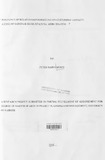| dc.description.abstract | Due to more and more fierce competition in today's business, many companies are required to build long term profitable relationship with customers. As a result of high competition experienced within Meru town due to opening up of several banks between the period of 2008 -2010, as seen the number of Banking service provider rising from seven banks to twelve Banks within a period of less than two years (Municipal council of Meru) this as brought about stiff competition to acquire and retain customers for profitable business engagement.
Therefore this study aimed to investigate the influence of relationship marketing on customer loyalty by focusing on the banking industry through a case of National Bank Meru Branch. As part of marketing strategy relationship marketing seeks to acquire and retain customers by providing good quality customer service, and therefore as become one of the keys to success in acquiring strong competitiveness in the present competitive market.
This study was guided by the following objectives: to determine the influence of service quality on customer loyalty, to determine the influence of Trust on customer loyalty, to establish the relationship between commitment and customer loyalty and to determine the influence of value offer on customer loyalty. The study was carried out in National Bank of Kenya Meru Branch where total populations of 5321customer were surveyed as at Feb 2010.
This study used descriptive research design from which a sample of 98 customers was chosen using probability sampling method were one customer was interviewed after every three customers who come into the banking hall while taking into consideration a precision error of 0.01. Two levels of statistical analysis were conducted with two different steps. The first level involved the use of basic descriptive statistics. This level of analysis was not intended for hypothesis testing, rather to enable the researcher to obtain a glance of the basic characteristics of the data. Test level involved two main statistical analysis, analysis of difference and analysis of relationship and influence.
Based on the test conducted there is no relationship between customer loyalty and demographic factors while the result by analysis of relationship shows that the four independent variables namely service quality, trust dimension, value offer and price were important factors influencing loyalty in banking sector. From the study conducted some recommendations have been suggested. The first recommendation is that if banks wish to retain and develop loyal customers they should be trust worthy, They must give and keep promises be concerned about the security of customers transactions, provide quality service, show respect to customers and be committed to their service ethics.
Lastly banks must recognize that many of their core product and service attribute are necessary but not sufficient for loyalty. Therefore Bank managers should be aware that delivering quality service to customers is very important for success and survival in the global competitive banking environment Banks need to have a strong connection with there customers in order to create and maintain customer loyalty. | en_US |

